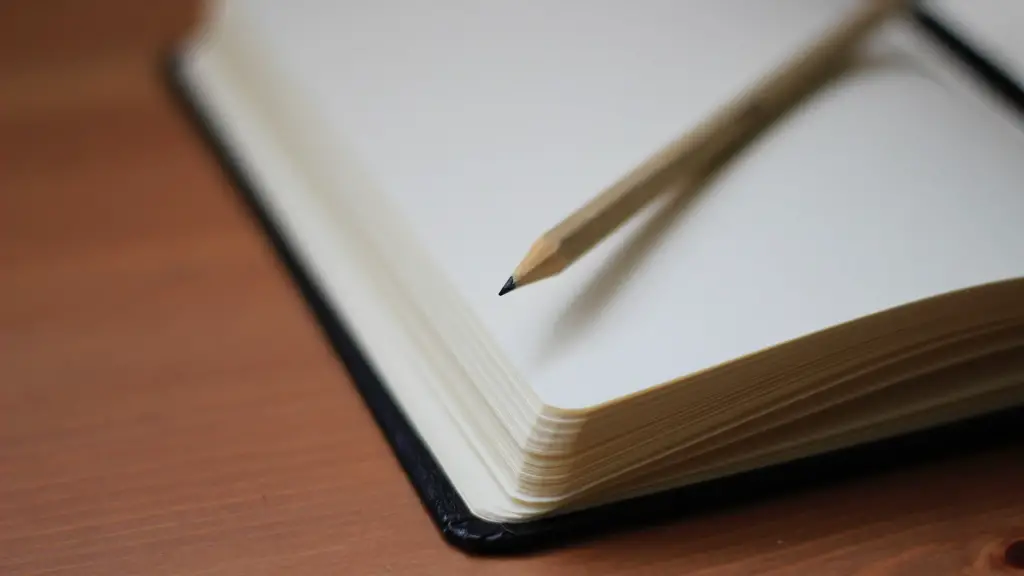Understanding the Basics
Poetry is a type of literature that has been around for centuries and comes in many different shapes and forms. It is an artistic form of expressing emotions, ideas and thoughts through words. In order to write your own, it is essential to understand the fundamentals of what makes a poem. To start a poem you will need to know the basic building blocks – rhythm, rhyme, imagery, tone and framework. It is important to understand these within the scope of your poem, as they will form the sturdy base on which to express your ideas.
The rhythm of poetry refers to the flow of words. It forms the backbone of any poem and dictates the tempo. Rhythm can be achieved by varying the length of sentences or lines, playing around with syllable structures and creating sound devices such as alliteration and assonance. Rhyme is one of the most common elements of poetry as it gives it a musical quality. The last word of each line is typically rhymed with the previous or next line to create this musical feel.
Imagery is another important aspect of a poem and it is the images, metaphors and symbols that are used to express an idea. Imagery creates emotion and evokes thoughts which can help the reader to connect with the poem. Tone is the attitude of the poem and it determines the way in which it is read. By controlling the tone, the poet is able to guide the reader in a certain direction and deliver a certain message. The framework of a poem is the form that it takes – it ranges from haikus, odes and sonnets. Knowing and understanding these basic components of poetry will allow you to start writing your own poem.
Research & Brainstorming
Once you have a good understanding of the basics you should take your time to research different types of poems and poets, as well as understanding the craft and techniques used by them. This research phase is important as it will help you to identify what element of the poem works best for you. You can take inspiration from established poets and look to see how they have arranged their poem, what structures and techniques they have used to bring out the hidden meaning.
Brainstorming should be the next step after research. Take time to come up with ideas and thoughts that you can use in your poem. It is useful to write down word associations, draw out visual images or to record your thoughts and feelings. Get creative and start to shape your ideas and thoughts – what emotions will your poem convey? What message or story do you want your poem to tell? Brainstorming will help these ideas and thoughts take shape.
Creating Structure & Finding Inspiration
Start to form a structure for your poem once you’re happy with your ideas and thoughts. Consider the type of poem that fits your story and the emotions you want to convey. Is it a sonnet? A haiku, an ode, a ballad? Choose a structure that is suitable and works with your ideas. Decide on the length and arrange the lines carefully in a rhythm that feels right. once you start to shape the poem, you should think about the message, story and emotions that you want to convey throughout the poem and make sure it is consistent as you move from one line to the next.
Finally, you should look for sources of inspiration that can help you to create the perfect poem. Look for images, music, books and even movies that can help to spark new thoughts, ideas and emotions. As you look for inspiration, pay attention to the little things around you – the conversations of strangers, the sound of birds, the way shadows move, or the scent of the rain. Inspiration can come from anywhere and anytime – the way someone talks, the way the clouds look – everything has the potential to be transformed into a piece of artwork.
Finalizing & Editing
Once you’ve created your poem, take time to read over it and make sure that all your lines flow together. It’s important to ensure that the structure, tone and rhythm of your poem is consistent throughout and that it conveys the right message. Read through the poem out loud and listen to how it flows – do certain sections feel out of place? Slow down the pace or change the structure of the lines if needed – the aim is to form a poem that captures the mood and feelings you had when your brainstormed and wrote the poem down.
After the poem has been written, it is time for the final touches. Take time to weed out unnecessary lines or words. This will help to make the poem more concise and focused. Finally, take time to find the perfect title for your poem. This will give the reader an initial insight into what the poem is about and entice them to keep reading.
Sharing Your Work Publicly
Now that you are happy with your poem and have completed the editing process, you should consider sharing your work publicly. Creating an environment whereby you can get constructive criticism and feedback will help you to develop as a poet. Online platforms such as poetry communities, that are associated with the platform or genre that your poem is related to can be very useful. They provide an opportunity for feedback from like-minded individuals who have the same interest, and you can use this to your advantage when sharing your poem.
In addition, social media can also be a great platform to share your work. Instagram and Twitter are both ideal for connecting with other poets and communities. They are public platforms, so make sure that you are aware of the terms and conditions and the potential risks associated with them before you post your work.
Entering Competitions & Publishing
Once you’ve gained enough confidence and polished your writing skills you can start to look into entering competitions. Literary journals, magazines and websites often host poetry competitions so make sure to keep an eye out for any potential ones that you can enter. By entering competitions, you can showcase your work to a wider audience and potentially get published. Even if you don’t get shortlisted, you can still use this opportunity to receive feedback and improve upon your writing.
If you are looking to get published, the process is slightly more involved and you should have a good understanding of the publishing industry. Websites such as Submittable, Duotrope and Poetry Magazine are useful for finding potential publishers for your work. It is important to do your research and read the terms and conditions carefully before submitting as different publishers and platforms require different forms of formats and methods for publishing your work.
Marketing Your Poems
Once you’re happy with the poem and have had it accepted for publication, you should look into marketing and promoting your poem. Creating a website and Facebook page, as well as other social channels to showcase your work is important when it comes to marketing. You can share snippets of the poem and use them to engage with potential readers and create a following. Having an online presence in the form of a website and social media will help you to showcase your work to a wider audience and establish yourself as a poet.
Recognition & Awards
The final step to becoming a successful poet is to gain recognition and awards. By entering different competitions and getting published, recognition is naturally gained as readers and peers can view your work and connect with it. Awards however, are slightly harder to come by as the judging process is highly selective. There are various awards that recognize poets of different genres. All you have to do is submit your poems or portfolios to the awards’ boards and wait for the results.
Every poet has their own unique path to success and there is no one-size-fits-all approach to starting poetry. All it takes is dedication and hard work. If you can consistently work on honing your craft, learning different techniques and seeking out recognition – you will eventually find your own style and settle into a comfortable writing process. Gaining awards, recognition and ultimately a following of readers is the ultimate goal of any poet, and starting with the basics is the foundation on which to build.


